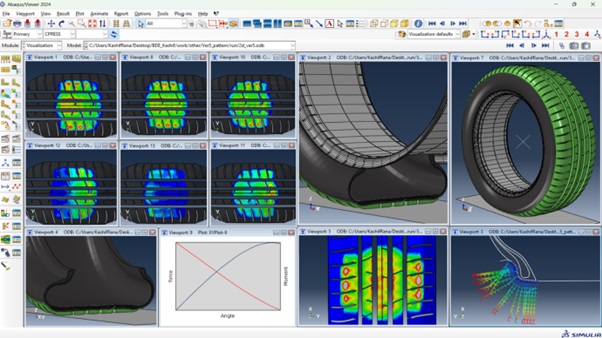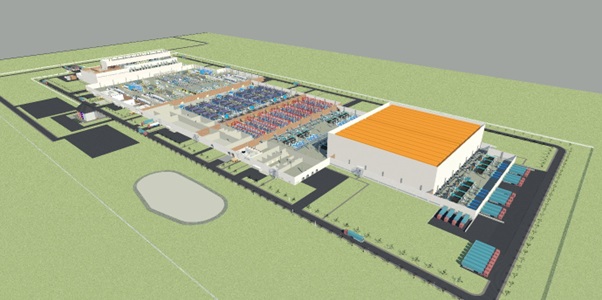Real-World Testing: A Timeless Necessity For The Tyre Industry
- By Sharad Matade & Gaurav Nandi
- December 26, 2024

Making a tyre is an extensive process that includes everything from formulation to testing. With the advancement in software-defined technology, tyre testing is increasing within a simulated environment. However, as real as the rubber wheel is, its testing in real-world environment stands as imminent in future course despite the current trend of simulation.
Alluding to this, Black Donuts Head of Tyre and Material Development Ilkka Lehtoranta told Tyre Trends, “Alongside the advanced laboratory equipment and various simulation methods, real-world tyre testing remains essential now and in the future. Physical testing in diverse conditions is critical for final evaluation and validation. Real-world tyre testing will continue to play a significant role moving forward. At Black Donuts, we offer comprehensive tyre testing services through our subsidiary, BD Testing. This company specialises in outdoor testing to ensure that products perform reliably in all environments.”
Commenting on the role of simulation in tyre development, he said, “Simulation plays a critical role in tyre development, offering a proven and essential part of the design process. One key type of simulation is finite element analysis (FEA), a mathematical method used to model and simulate physical phenomena. FEA is widely employed across industrial sectors including tyre manufacturing to predict and validate design performance before creating physical prototypes.”

“For tyre development, simulation tools provide significant advantages. By conducting design verification and validation virtually, companies can reduce the need to produce experimental tyre, which saves raw materials and minimises waste. This approach not only supports environmental goals but also accelerates the development timeline, allowing for faster iterations and refinements. Black Donuts integrates various simulation methods into its development process, heavily relying on the results to optimise designs,” he added.
Testing facilities
The Finnish company offers comprehensive tyre testing services with a primary focus on outdoor testing rather than indoor facilities. While indoor testing facilities are widely available globally, including in Europe, Asia, India and North America, Black Donuts has chosen to concentrate on outdoor testing. The company leverages the expertise of skilled test engineers and drivers, who understand the nuances of environmental and external factors, to deliver dependable testing outcomes.
“We operate a proving ground in northern Sweden, where winter tyres are tested under snowy and icy conditions. Additionally, we have a testing centre in Finland’s Tampere region, which serves as a hub for evaluating tyre properties across a range of conditions. The facilities enable grip testing on ice, snow, wet and dry surfaces; noise testing for internal and external evaluations; handling and comfort assessments; aquaplaning analysis and tailored tests developed to meet specific customer needs,” informed Lehtoranta.
He mentioned that test drivers are central to Black Donuts' outdoor testing process as their expertise in assessing tyre behaviour is critical for validating designs and providing feedback to engineers. This collaboration ensures the test results are seamlessly integrated into the design and development process, allowing engineers to refine tyre properties based on real-world performance insights.

Winter testing is conducted during the colder months to utilise natural snow and ice conditions. While the company does not have an indoor snow-testing facility, it makes use of local resources such as ice halls for ice-related evaluations. For summer tyres, the focus shifts to testing grip, handling and noise levels under both dry and wet conditions.
In addition to testing during tyre development, Black Donuts supports homologation and certification processes. Through its subsidiary, BD Testing, the company provides accredited testing services and official test reports required for certifications by authorities. This includes European homologation tests for snow and ice performance, as well as specialised assessments such as road wear impact evaluations for studded tyres in Scandinavian markets.
The company also conducts internal testing to collect data, monitor market trends and benchmark tyre performance. “This continuous research helps us to identify industry standards and emerging trends, ensuring that our tyre development projects remain innovative and competitive,” averred Lehtoranta.
Industry peek
Black Donuts provides end-to-end solutions for the global tyre industry, catering to both manufacturing and tyre research and development needs. Its services cover tyre design and production, materials research and development, making the company a comprehensive partner for tyre manufacturers globally. Whether supporting the establishment of new tyre plants, upgrading existing facilities or offering specific technical expertise, it has a broad portfolio of engineering and technological solutions.
In production, Black Donuts assists manufacturers with everything from setting up greenfield projects to improving brownfield facilities. For existing manufacturing lines, the company conducts thorough audits to identify bottlenecks, inefficiencies and quality issues. The focus often includes increasing automation, enhancing productivity, reducing manufacturing costs, improving quality, minimising scrap and waste and even reducing tyre weight. These solutions are tailored to meet the specific demands of the client.
For greenfield projects, it offers turnkey solutions. These include site selection support, plant layout design, architectural planning, defining machinery specifications, automation strategies and utility calculations. During the execution phase, an on-site engineering team supervises construction, machinery installation, commissioning and the ramp-up of production processes. The company also trains operators, troubleshoots quality issues and supports clients in improving efficiency. The level of post-production support is flexible with options for ongoing assistance tailored to the client's needs.

Alluding to how the design and production process differ across regions, the executive said, “The design and production processes themselves are generally consistent across regions. However, automation levels may vary based on factors like labour costs and plant location. European facilities, for instance, often require higher automation levels due to higher manpower costs, though automation is increasingly being adopted in Asia as well. This trend has significantly reduced manpower requirements in tyre manufacturing globally, driven by advancements in automation technologies.”
Research and development
In tyre development, significant trends include the growing demand for sustainability, increased automation in production processes and evolving design needs tailored to regional and market-specific conditions. Tyre materials development is a subset of tyre development but is critical due to its role in addressing environmental and performance challenges. Black Donuts works on both these aspects, helping clients innovate while navigating changing demands in the tyre industry.
The push for sustainability is the most pressing challenge in tyre material development. There is an increasing emphasis on replacing fossil-based materials with sustainable alternatives like bio-based and recycled raw materials. Black Donuts plays a pivotal role in identifying and testing new materials available in the market, integrating them into tyre compounds and ensuring its compatibility with production processes.
In addition to working with existing materials, Black Donuts has initiated its own research and development efforts to explore innovative, out-of-the-box sustainable solutions. These include new bio-based raw materials currently under internal development, which are expected to be launched soon.
On the tyre development front, it offers comprehensive services for creating new tyre lines across segments like passenger car radial (PCR), truck and bus radial (TBR) and off-the-road (OTR) tyres. The designs cater to various markets including Europe, US, Asia and Africa, ensuring optimal performance under different environmental and regulatory conditions.
Customisation for specific client needs, whether summer or winter tyres, and adapting designs to suit regional preferences are also part of the company's everyday operations.
Competitive edge
The rapid evolution of technology, automation and sustainability trends demands agility and adaptability. Black Donuts maintains an active presence in the market, staying updated on global developments by leveraging its extensive partner network, including machinery and raw material suppliers, to gather insights and anticipate emerging trends.
 Alluding how the company selects partners, the executive revealed, “The partner selection process is fundamental to delivering high-quality, innovative solutions. Many members of our team have decades of experience and longstanding relationships with suppliers, which provide a solid foundation for selecting trusted partners. Besides, there are several factors that are taken into account to source new partners.”
Alluding how the company selects partners, the executive revealed, “The partner selection process is fundamental to delivering high-quality, innovative solutions. Many members of our team have decades of experience and longstanding relationships with suppliers, which provide a solid foundation for selecting trusted partners. Besides, there are several factors that are taken into account to source new partners.”
One of the most crucial factors in selecting partners is the technological capability. Black Donuts prioritises partners that offer cutting-edge technologies, which can add value to both the company and its customers. It also carefully evaluates the ability of potential partners to deliver machinery, raw materials and components as promised. Moreover, the company seeks partners who share values of sustainability.
While Black Donuts draws on its established relationships with trusted suppliers, the company remains proactive in sourcing new partners and exploring the latest advancements in technology and materials.
Sustainability
The executive noted that in the next five years, the proportion of renewable or bio-based materials in tyre production is expected to remain relatively modest. “Currently, aside from natural rubber, which makes up around 20 percent of tyre materials, the use of other renewable materials is almost negligible. While the industry faces challenges in sourcing and incorporating bio-based and recycled raw materials, it is estimated that within five years, the share of such materials could reach 30-35 percent of the total tyre content,” said Lehtoranta.
Alluding to industry goals of incorporating 100 percent renewable materials in tyres by 2050, he noted, “Incorporating 100 percent renewable materials in tyres is possible, but it will require collective action across the entire industry. All stakeholders must align and collaborate towards this common goal. Many mid-sized and smaller companies may struggle with this transition on its own, which is where industry partners can offer valuable support. This is also why companies are increasingly focusing on researching and developing new bio-based raw materials in order to expand the availability of these alternatives in the market. However, scaling these innovations to a commercial level remains a challenge as many promising ideas have not yet been fully realised on a large scale,” informed the official.
He also noted that achieving sustainability in tyre production will undoubtedly require significant investment. A key challenge is that sustainable raw materials are currently more expensive than conventional alternatives. Unfortunately, many end consumers are not yet willing to pay a premium for tyres made with sustainable materials.
Market presence
Black Donuts has a presence on all continents. “We have a strong market footprint, serving a wide range of regions. For instance, of the 25 largest tyre manufacturers, 20 have been or are currently our customers. We also have upcoming projects across Europe, Asia, North America, South America and Africa, highlighting our global reach and ongoing expansion,” said Lehtoranta.
He added, “In terms of revenue, our biggest business segment revolves around providing end-to-end solutions for tyre plants including services related to tyre factory setup and operations. This is the largest segment in terms of financial impact. Additionally, tyre and material development is another major part of our business contributing significantly to our overall revenue.”
North America is one of its largest markets, followed by Europe and Asia, though revenue distribution can vary year by year due to the nature of projects.
He also noted that regulations play a crucial role in driving the business. The regulation concerning studded tyres, for instance, which has been important in the European market. Winter tyre regulations, particularly the requirement for the snowflake symbol on tyres, are also significant, especially in Nordic countries.
Additionally, a newer regulation being prepared by the European Commission concerning tyre abrasion, which is becoming a more prominent issue due to sustainability concerns, is also slated to drive business.
Commenting on the same, the executive said, “Tyre abrasion, especially concerning microplastic emissions, has gained attention in Europe as tyres are recognised as a major contributor to microplastic pollution. The industry and authorities are now focusing on reducing this issue by improving tyre wear properties. The goal is to ensure that tyres generate less microplastic per kilometre driven. This is particularly relevant in regions with snowy and icy roads, where tyre performance and durability are critical.”
Furthermore, he highlighted that the difference between snow and ice significantly impacts tyre performance. Ice presents much lower friction than snow, which is why ice poses a more challenging driving condition. Tyres perform worse on ice, resulting in longer stopping distances. In regions with icy roads, like the Nordic countries, manufacturers often use studs to enhance grip on ice, improving safety by reducing braking distances.
Expansion and demand
The executive mentioned that the company is expanding in the Asian and North American markets. “While winter tyres are a big demand in these regions, it's important to note that winter tyre usage varies by region. In China, for example, there is a significant demand for winter tyres, particularly in colder regions, and Japan has a large market for them as well, with regulations encouraging its use. North America, especially in regions with harsh winters, also has a strong market for winter tyres,” said Lehtoranta.

“Despite the slowdown in the European market and concerns about the US market, we still see North America as a strong growth area for us. We haven't noticed any significant slowdown in our business there and the market remains promising. However, we also see great potential in Africa, where we are seeing a lot of investment activity,” he added.
Answering what factors led the company to explore avenues in Africa, he said, “Several factors are driving the growth potential in Africa. Currently, there is little local tyre manufacturing in the region and many countries are looking to establish local industries to boost the economies and create jobs. Additionally, Africa has significant natural resources including natural rubber and oil, which can be used to produce synthetic rubbers and other raw materials needed for tyre manufacturing. Local production would enable companies to add value by refining these raw materials into finished products like tyres, creating a more sustainable and profitable cycle.”
Commenting on future plans, he said, “Our focus will be on the entire tyre lifecycle, from raw materials to production, performance and ultimately, the end of life of the tyres. We are working on developing solutions that handle tyre disposal and recycling with the goal of creating a fully sustainable tyre manufacturing process. This approach would ensure that our products and services are environmentally friendly throughout the entire supply chain.”
Industry challenges
Tyre manufacturing factories often encounter several challenges when setting up greenfield and brownfield projects. One of the primary challenges is managing the project’s schedule and budget, ensuring that the project stays on track and within financial constraints. Another critical aspect is reaching the targeted capacity for the plant, which can be challenging given the complexities of large-scale projects.

Additionally, there are technological hurdles that the company must overcome, especially in terms of innovation and research. Developing new technologies and sustainable solutions for the industry is not an easy task and requires a long-term commitment.
In terms of business challenges, the company is focused on technological innovation and research. Developing cutting-edge technologies and creating sustainable solutions for tyre manufacturing is a key priority. However, this process is often time-consuming and requires significant effort. This is where Black Donuts’ know-how and cutting-edge solutions come into play. The company is currently focused on pushing the boundaries of what is possible within the tyre industry, particularly regarding sustainability.
Regarding operations in India, the company is in the early stages of its expansion. Although it does not have a physical office in India yet, it has begun operations under the leadership of a technical director. The goal is to develop the business in India and gradually establish a technical centre that will focus on tyre simulation and other technical areas of tyre development.

The Chinese market is another area of focus. While it is not the largest market for the company, it remains an important one, with ongoing projects and customers in China. The company recognises that China is a significant player in the global tyre industry, and it continues to engage with the market, even though it is not the biggest revenue driver.
Additionally, the company is observing a trend where manufacturing is returning from Asia to local markets, a shift that began before the pandemic and has been accelerated by it. This trend is visible in regions like Africa, North America and Europe, where companies are establishing local production to mitigate supply chain issues and reduce reliance on distant markets. This shift represents a significant opportunity for the company to expand its operations and grow its presence in these regions.
Sangwoo Ryu Named CEO Of Kraton Corporation
- By TT News
- February 07, 2026

Kraton Corporation, a leading global producer of speciality polymers and high-value bio-based chemicals derived from pine wood pulping co-products, has named Sangwoo Ryu as its new Chief Executive Officer. Ryu possesses over 25 years of leadership in finance and operations within international markets. He is currently the CEO of Cariflex Pte Ltd, a former Kraton spin-off now under DL Chemical, where he initially served as Chief Financial Officer starting in February 2020. He assumed the Cariflex CEO role in April 2025 following the promotion of its former CEO, Prakash Kolluri, to President of Kraton's Polymer business.
Ryu’s deep expertise in financial strategy, investment controls and operational planning is expected to strengthen Kraton’s standing as a reliable leader in global Pine Chemical and Polymers markets. In his new position, he will collaborate with Kraton’s Executive Leadership, Board of Directors and Cariflex Leadership to guide strategic decisions and operational excellence, reinforcing the company’s commitment to sustained growth and organisational stability.
Ryu said, “I want to express my gratitude towards the members of the Board of Directors and the Kraton Leadership Team for their unwavering dedication to Kraton’s success. I’m looking forward to leading Kraton into the next era of excellence, building upon the strong foundations and principles set forth in our vision and values.”
Industry Veteran Dieter Jerschl To Represent FORNNAX In Central Europe
- By TT News
- February 07, 2026

As part of its strategic growth into Central Europe, FORNNAX TECHNOLOGY, a global leader in recycling equipment manufacturing, has established a new sales partnership in Germany. The company has appointed industry veteran Dieter Jerschl as its representative for the region to drive the promotion and implementation of its recycling systems. Jerschl’s extensive expertise, built over two decades with prominent firms like BHS, Eldan and Vecoplan, encompasses a deep understanding of diverse waste streams such as tyre, cable, municipal solid waste and e-waste.
This collaboration, initially targeting Germany, Austria and adjacent countries, is designed to be flexible and scalable. Its primary aim is to cultivate a strong project pipeline and solidify FORNNAX’s regional footprint. The partnership extends beyond sales to include comprehensive technical support, with Jerschl’s team providing vital value-added services like installation, maintenance and spare parts assistance. This local service framework is intended to ensure efficient project execution, minimise operational downtime and elevate customer satisfaction.
By leveraging Jerschl’s profound market insight and established networks, FORNNAX seeks to accelerate the adoption of its high-performance shredding and pre-processing technologies. The move underscores the company’s global strategy of embedding local expertise within key markets, which it deems crucial for developing technically sound solutions tailored to specific regional waste challenges. This initiative reinforces FORNNAX’s dedication to innovation and environmental stewardship, advancing its mission to deliver sustainable recycling solutions worldwide.
Jerschl said, “I’ve known FORNNAX for over a decade and have followed their growth closely. What attracted me to this collaboration is their state-of-the-art technology; it is powerful, sustainable, and economically viable. There is great potential to introduce FORNNAX’s innovative systems to more markets across Europe, and I am excited to be part of that journey. We are committed to increasing market awareness and establishing new reference projects across the region. My goal is not only to generate business but to lay the foundation for long-term growth. Ideally, we aim to establish a dedicated FORNNAX legal entity or operational site in Germany over the next five to 10 years.”
Jignesh Kundaria, Director and CEO, FORNNAX, said, “We see tremendous potential in the Central European market. Partnering with someone as experienced and well established as Jerschl gives us a strong foothold and allows us to better serve our customers. This marks a major milestone in our efforts to promote reliable, efficient and future-ready recycling solutions globally.”
- KraussMaffei Extrusion
- Fernley H. Banbury Award
- Rubber Division of the American Chemical Society
- Sustainable Rubber Processing
- Global Polymer Summit
KraussMaffei’s Dr Gerard Nijman Earns Prestigious Fernley H. Banbury Award For 2026
- By TT News
- February 06, 2026

Dr Gerard Nijman of KraussMaffei Extrusion has been selected as the 2026 recipient of the prestigious Fernley H. Banbury Award, one of the rubber industry’s highest international honours, presented by the Rubber Division of the American Chemical Society (ACS). This award annually recognises outstanding scientific and technological contributions to the field.
The award commemorates the inventor of the internal mixer and highlights sustainable innovations in production technology, instrumentation, process control and the development of processing methods for rubber and similar materials. Dr Nijman’s career exemplifies such innovation, having significantly advanced rubber rheology, pioneered new mixing and multiplex extrusion technologies and modernised the production of silica compounds for the tyre industry.
His work has effectively bridged the gap between scientific research and industrial application. Notably, in the 1990s at Vredestein, he introduced novel mixing technologies and multiplex extrusion to tyre manufacturing. He also contributed to pioneering processes for silica compound processing, foundational to technologies like Michelin’s ‘Green Tyre’. Furthermore, his rheology-based designs for extruder screws and flow channels have helped shape enduring industrial standards.
Dr Nijman, who joined KraussMaffei Extrusion in 2017, brings decades of expertise from previous roles at Apollo Tyres Ltd and Vredestein Banden BV. His ongoing collaborations with the German Institute for Rubber Technology (DIK) and the University of Twente have also profoundly influenced his approach. KraussMaffei Extrusion itself is globally recognised for its tyre technology, building on longstanding Berstorff expertise to deliver advanced extrusion solutions for treads, sidewalls, innerliners and other components, as well as high-performance multiplex and calender systems.
The award acknowledges not only his specific technical achievements but also his distinguished career and lasting impact on rubber processing. The official presentation will be held in September 2026 during the Global Polymer Summit in Louisville, Kentucky, US.
Dr Nijman said, “It is a great honour for me to receive the Fernley H. Banbury Award. This recognition confirms the importance of the close connection between research and industrial practice in rubber processing and motivates me to continue to drive forward innovative solutions for our industry.”
Ralf Benack, Managing Director, KraussMaffei Extrusion, said, "We warmly congratulate Dr Nijman on this outstanding award. With his in-depth knowledge, many years of experience and tireless dedication, he has had a decisive influence on the rubber and tyre industry and has further developed our technologies in a targeted manner. This recognition is more than deserved. We are very proud to have Dr Nijman in our team!"
Michelin Appoints James Dimmock As Commercial Communications Manager For UK And Ireland
- By TT News
- February 05, 2026

Michelin has appointed James Dimmock as its new Commercial Communications Manager for the United Kingdom and the Republic of Ireland. Based at the company's Stoke-on-Trent headquarters, he will report to the Northern European Communications team. In this capacity, Dimmock will oversee all commercial communications, including public relations, social media and influencer partnerships.
His mandate involves crafting the brand's commercial narrative, fostering stronger connections with media and content creators and producing innovative digital content to support the brand's growth. He brings more than two decades of extensive experience with Michelin to the role, having held various senior marketing and communications positions both internationally and domestically. His most recent role was as Social Media and Influencer Manager. He will now lead these efforts locally while integrating with the broader communications team.
John Howe, Managing Director, Michelin UK, said, “James has already made a significant contribution to Michelin communications activity in the UK & ROI. His deep understanding of our business and products, combined with his strategic and creative approach, makes him ideally placed to lead our commercial communications as we continue to evolve our brand.”
Dimmock said, “I am excited to be taking on this new role at Michelin. It is a privilege to continue building on the work we have already achieved and to help drive the next phase of our commercial communications strategy across the UK & ROI.”







Comments (0)
ADD COMMENT